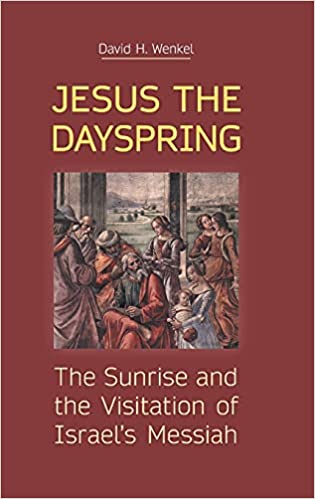An Author Interview from Books At a Glance
Would you like to watch the video interview or listen to the audio? Sign-up today for access to these features and more.
In Luke 1:78 Zechariah describes the fulfillment of the Messianic promise as “dayspring” or “sunrise” – “the sunrise shall visit us from on high.” Where did Zechariah get that metaphor? Did he make it up himself? Or just maybe he was a better student of Scripture than the rest of us and was making an important connection that we have too often overlooked!
Greetings! I’m Fred Zaspel and welcome to another Author Interview here at Books At a Glance. Today we have David Wenkel with us to talk about his fascinating new book, Jesus the Dayspring: The Sunrise and the Visitation of Israel’s Messiah.
David, welcome, and congratulations on your new book!
Wenkel:
Thank you, Fred. It is a blessing and honor to share a little bit of what I have learned from searching God’s word and putting this academic volume together. I hope I can share insights that others can profit from and use in their ministry.
Zaspel:
I’ve already given the clue but tell us what your book is all about. We will talk about some specifics in a moment, but here just get us on track. What do you hope to accomplish in your book?
Wenkel:
In Luke 1:78 there is a unique reference to Jesus with a messianic title of dayspring. That Greek word is also translated as sunrise and various similar words. What I wanted to do is consider how that messianic title developed. Although we will never be able to get inside Zechariah’s head, we can see from the Gospel of Luke that he was interested in the promise and fulfillment of God’s word. Luke’s Gospel directs the reader to look at the entirety of Scripture to see how God’s promises are fulfilled and how they work out through different passages in different books.
We can see how all Scripture is inspired, even though there are various human authors it has one divine author, God. God has made a unifying thread somehow through the Scriptures that Zechariah was picking up on. He was responding out of his joy upon hearing that his son, John the Baptist, would be the forerunner of Israel’s Messiah. To his understanding, God was fulfilling these great promises that God’s people have longed for. What my book does is it casts a bit of a wide net and tries to look at this idea of a connection between Israel’s Messiah and the sunrise. Also, I look into the idea of looking eastward.
The first thing that I do is look to passages in Genesis of the garden. We look at how the direction of East and looking eastward plays an important role there. As you look at later books like Exodus the direction of looking eastward becomes a critically important fact in Israel’s redemption. The wind that parted the waters of the sea that saved Israel was the East wind. In Numbers, as Israel went into the wilderness, it is likely that it was the East wind that brought the quail for Israel to eat. This East wind is identified by Isaiah as God’s Holy Spirit. There is this intimate connection not only in Genesis but in God’s definitive redemption of Israel from Egypt, that ties together the idea of looking eastward and God’s presence.
Zaspel:
Give us some specifics in Zechariah’s song in Luke 1 that connect his thinking to the Old Testament Messianic expectation.
Wenkel:
One discussion I get into is about the Greek word translated in the King James as dayspring. I explore if that was associated with sprouting up which has a motion of moving upward and outward. Or whether it had a connotation with celestial events of the sunrays moving up and outward. There are very similar movements of a sprout moving up and a ray of light moving up and outward. I concluded that in this passage in Luke 1:78, it is the celestial idea that is prominent.
I discuss how this draws in a whole range of passages. We tend to think in static categories when thinking of God being associated with light, and sin, Satan, and death are associated with darkness. There is also a sense in which there is a dynamic to them as well. These concepts are woven into the whole story of redemption from creation, fall, redemption, and consummation. I wanted to see how this dayspring idea was dynamically woven into the whole storyline of Scripture.
Zaspel:
We can’t have you reproduce your book here but take a few minutes and survey this broader Old Testament expectation for us.
Wenkel:
One of the exciting passages that really started to draw attention to this is found in Exodus 14:21 and 15:10. It is about the East wind that saved Israel. This idea is picked up in Isaiah 41:25. I show that God brings people who come to accomplish his redemptive purposes through Israel. When God brings these individuals, Isaiah references them as coming from the East. As you progress from Genesis to the prophets you start to see how this expectation of God’s arrival from the East may start very broadly but narrows in its focus as it develops typologically.
There is a pattern across Scripture so that it becomes narrower and more applicable to the expectation of a singular person. It is interesting as we see how it is possible for a Jewish priest like Zechariah to hear about the upcoming fulfillment of God’s redemption in the person of the Messiah and for him to reference that person as the sunrise and culmination of this hope that will visit his people. Malachi 4:2 is another passage that calls him the Sun of Righteousness. We respond out of joy for his coming.
Zaspel:
In the latter part of your book, you focus on Luke-Acts and how the New Testament furthers this theme – tell us about that.
Wenkel:
I try to connect this idea to Luke’s concept of visitation. Luke identifies the coming of the Messiah of Israel as the visitation of God. The coming of Christ is the visitation of the Lord. The arrival of Jesus is the equivalent of the arrival of the Lord. That language of visitation is connected to the arrival of God as a visitor among his people. This idea of divine visitation is related to this whole arch of hope for God’s arrival. It is the anticipation of receiving him with hospitality.
What is so important is that at the beginning of the Gospel of Luke, he sets up the anticipation of God’s arrival through Christ with the idea of the dayspring. Then Jerusalem should see God coming from the East. We see that in Luke 19. When Jesus comes down from the Mount of Olives, he arrives in the city through the direction of the East. There is just enough detail to justify the conclusion that he sees some element of the fulfillment of Jesus’ arrival in that direction.
Zaspel:
Okay, in brief – the elevator speech. Someone in the elevator asks, “What is your thesis? What are you trying to establish in your book?” You have maybe 30 seconds. What do you say?
Wenkel:
It is a description of how Jesus fulfills God’s promises as the person who comes to visit his people and save them. He comes from the direction of the East just like God said he would. He is Israel’s Messiah and Savior but also the Savior for the entire world. He is the one who came with healing in his wings so that he might die to save us from our sins. There is a wonderful thread we can see throughout Scripture that helps us see how it all ties together.
Zaspel:
We are talking to David Wenkel about his excellent new book, Jesus the Dayspring: The Sunrise and the Visitation of Israel’s Messiah. It’s an enlightening study of a too-often-ignored biblical and christological theme.
David, thanks for your good work, and thanks for talking to us today.
Wenkel:
Thank you, Fred.
Buy the books

JESUS THE DAYSPRING: THE SUNRISE AND THE VISITATION OF ISRAEL’S MESSIAH, by David H. Wenkel
